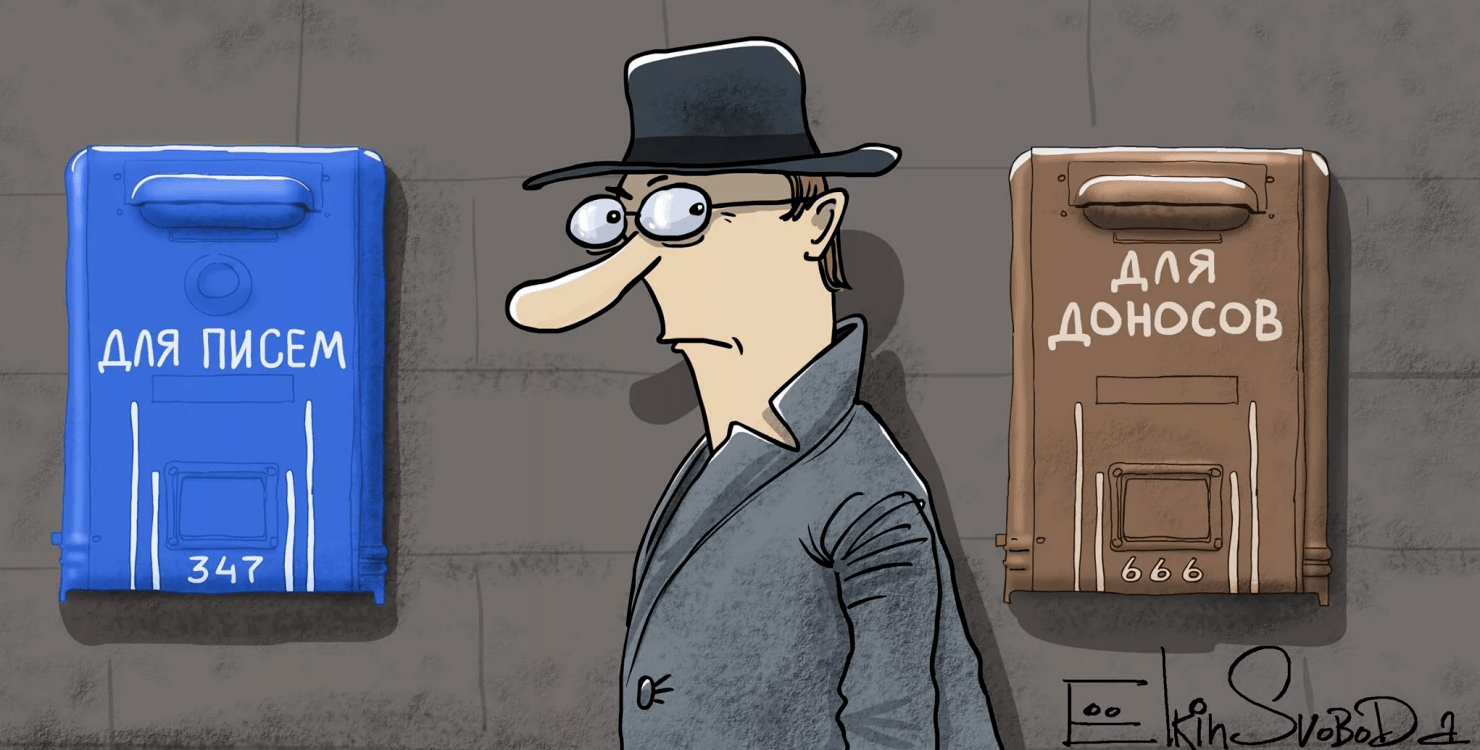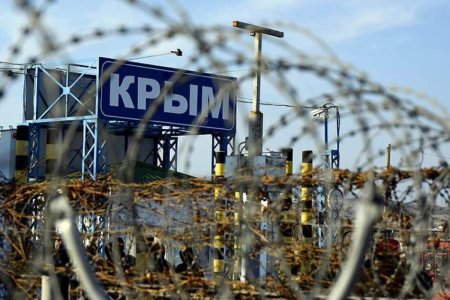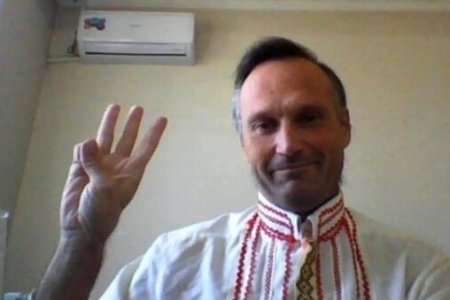
Andriy Bielozierov lost his job as a lecturer in occupied Crimea after he was denounced by students or their parents for playing a Ukrainian song. He is now under house arrest and facing a possible 5-year sentence after another denunciation. In Russia, 20-year-old Olesya Krivtsova could spend up to 10 years in prison after fellow students reported her comments opposing Russia’s war against Ukraine. Just as in the worst years of Soviet terror, it has become dangerous to openly speak of the crimes Russia is committing in Ukraine, or even shout ‘Glory to Ukraine’.
None of this is strictly new. The current regime under Vladimir Putin has long been encouraging anonymous denunciations of neighbours or workmates for supposed ‘extremist’ or ‘anti-Russian’ activities. In 2019, Russia also criminalized the failure to denounce a person for supposed ‘terrorist’ or ‘extremist’ activities, although these charges are regularly used in occupied Crimea and Russia as a weapon of political persecution.
In August 2022, Russia’s effective censor, Roskomnadzor announced that in the first half of the year it had received 145 thousand complaints from individuals, denouncing neighbours, colleagues, teachers or the media for supposed ‘fakes’ about Russia’s so-called ‘special military operation’. This, Roskomnadzor said, was 25% up on the analogous period the previous year. People had most often demanded that Roskomnadzor remove “links to resources with pro-Ukrainian propaganda”, with the majority of questions concerning what was claimed to be ‘”fakes about the special military operation in Ukraine”.
One need only look at the huge sentences passed on Alexei Gorinov, Ilya Yashin, Maria Ponomarenko and Dmitry Ivanov to see that the Russian regime is imprisoning people for telling the truth about heinous war crimes, claiming truthful information to be ‘fakes’ (under Article 207.3 of the Russian criminal code). The second repressive norms, against what is termed ‘discrediting the Russian armed forces’ and added to Russian legislation within 10 days of the full-scale invasion of Ukraine are, in turn, used as a weapon against those who express opposition to the war. A huge number of people in occupied Crimea and in Russia have received steep fines or brief jail terms under this norm merely for a video playing Ukraine’s National Anthem, a Ukrainian patriotic song at a Crimean Tatar wedding or the words ‘no to war’.
Worth recalling the bitter response to these Roskomnadzor statistics from Nikolai Polozov, a Russian lawyer representing many Crimean Tatar and other Ukrainian political prisoners “We endlessly curse comrade Putin and, of course, with justification.” It is not, however, Russian leader Vladimir Putin’s cronies in high places who wrote almost 145 thousand denunciations. “Nothing of the sort. They were written by ordinary Russians.”
The statistics coincided with the announcement from the so-called ‘mayor of occupied Sevastopol’ Mykhail Razvozhayev that a chat-bot had been created for denunciations of those supporting Ukraine.
He did not, of course, use blunt words like ‘denunciation’. Instead, he proposed that Crimeans send “information about presumed danger; suspicious individuals; about everything that now, in one way or another impacts upon our security.” Tell us, he continued, if you see that somebody is supporting Kyiv. The information will be available to all enforcement bodies.
In occupied Crimea, most of the recent reports of persecution on charges of ‘discrediting the Russian armed forces’ or of ‘fakes’ have named notorious pro-Russian bloggers, Russian-installed politicians, etc. as the source of the denunciations.
In Russia, the denunciations do often appear to come from neighbours, colleagues, fellow students, etc. Verstka Media have studied recent court rulings and concluded that denunciations have become a mass thing in Russia. People are detained and fined, they report, for remarks made in bars, supermarkets; saunas; at the post office, or even on the porch of their own home. In the vast majority of cases, this is not because an FSB or police officer was standing nearby, but because of denunciations to such bodies. Verstka’s scrutiny of the court reports showed that such denunciations – and dozens of prosecutions - had been prompted by “conversations about Ukraine; listening to Ukrainian songs; pronouncements about the special military operation or simply the phrase ‘Glory to Ukraine!’
Alexei Ovchinnikov, his wife Olesya and her female friend planned to enjoy dinner in a restaurant in Krasnodar on 29 January 2023. Instead, Alexei ended up jailed for 15 days for supposed ‘hooliganism’ and Olesya fined 40 thousand roubles (and a further one thousand on the ‘hooliganism’ charge). The two women had begun discussing Russia’s war against Ukraine, while Alexei was outside having a cigarette. Another customer demanded that they stop and then initiated conflict with Alexei. The Russian Guard appeared and very roughly forced the couple to the floor. As well as the ’hooliganism’ charges (against them, not the person who initiated the conflict), Olesya was charged under Article 20.3.3 of Russia’s code of administrative offences with discrediting the Russian army. It was claimed that she had done this through the phrases ‘Glory to Ukraine!’, ‘Glory to the Heroes!’ and ‘Glory to Zelensky’.
Verstka found around 15 administrative prosecutions for ‘discrediting the Russian army’ and ‘demonstrating extremist symbols’ linked with mention of Ukraine in shops; at the post office; in banks; in discos or on the street. The denunciations come sometimes from strangers, sometimes from neighbours.
In one of the cases cited, Andrei Anfilatov was prosecuted and fined 30 thousand roubles for supposedly ‘discrediting the Russian army’ for listening to loud music in his car and, allegedly, saying ‘Glory to Ukraine!’. He explained in court that he had simply been listening to the song ‘Chervona Kalyna’ [‘Red Vibernum’] which has the words ‘Glorious Ukraine’ in it.
In fact, simply playing or singing the patriotic song ‘Chervona Kalyna’ has resulted in multiple prosecutions in occupied Crimea. In September 2022, for example, several members of two families and a disk jockey were jailed for up to 15 days for playing the song at a Crimean Tatar wedding. The occupation regime reached new depths on 10 March 2023 when a young woman, Elvira Memetova, was fined 50 thousand roubles for a video with Ukraine’s National Anthem. That, too, was claimed to ‘discredit Russia’s army’.



